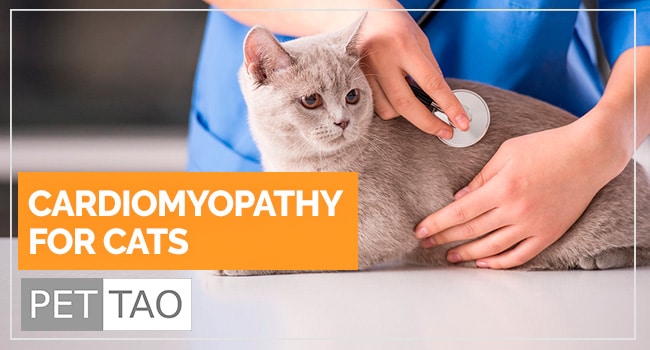When your cat isn’t feeling well, it hurts you too.
If the veterinarian diagnoses your cat with cardiomyopathy, you’ll have many questions for your veterinarian.
What is Cardiomyopathy in Cats?
Hypertrophic cardiomyopathy (HCM) is one of the most common types of heart disease in cats.
And, HCM, a genetic disorder, causes the muscular walls of the heart to thicken.
What are the Symptoms of Cardiomyopathy?
Early signs of HCM:
- Low energy
- Decreased appetite
- Weight loss
Your vet may notice:
- Elevated heart rate
- Heart murmur
- Gallop rhythm (extra heart sound)
Advanced signs of HCM:
- Panting or labored breathing
- Sudden paralysis in hind legs
- Cough (unusual)
- Sudden death
Which Cats Are Most at Risk?
Cardiomyopathy in cats is most prevalent in between 1 and 5 years old but can occur as young as 3 months or as late as 10 years.
Because HCM is genetic, it occurs most often in specific breeds, such as Maine Coon Cats, Ragdolls, British Shorthairs, American Shorthairs, and Devon Rexes.
However, female domestic short-hairs are also at risk.
What are the Complications Associated with Cardiomyopathy in Cats?
Unfortunately, undiagnosed cardiomyopathy can lead to serious health consequences.
Congestive Heart Failure
If the heart’s pumping action fails, blood backs up into the left and right atrium.
Then, the blood backs into the pulmonary circulation, leading to pulmonary edema – fluid buildup in the lungs – shortness of breath, and congestive heart failure.
Arrhythmias
Arrhythmias, irregular or fast heartbeats, develop in the diseased heart muscle.
HCM causes stretching and scarring, which disrupts electrical signaling in the heart.
However, Arrhythmias, which cause no symptoms, contribute to pump weakness and congestive heart failure.
Thromboembolism
Thromboembolism is a blockage caused by a migrating clot.
When the left atrium gets stretched out, blood flow stagnates and blood clots form.
Clot fragments break loose, enter circulation, and get stuck, causing thromboembolism.
What is the Life Expectancy for Cats with Cardiomyopathy?
The life expectancy and general outlook for cats with HCM vary from case to case.
Sometimes, cardiomyopathy in cats worsens quickly.
However, other cats live symptom-free for years.
Consequently, the prognosis is directly related to the severity and complications related to the disease.
Upon the onset of congestive heart failure, life expectancy is 18 months or less.
The best way to care for your cats is to feed them a balanced diet and take them for annual veterinary check-ups.








